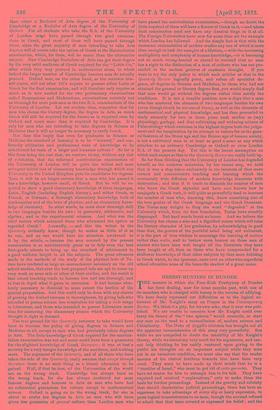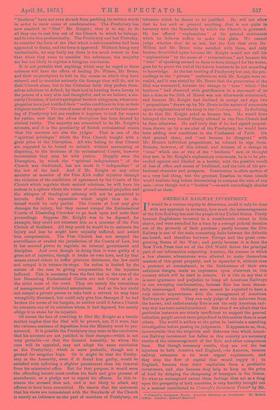HERESY-HUNTING IN DUNDEE.
THE manner in which the Free-Kirk Presbytery of Dundee has been dealing, maw for some months past, with one of its members who is charged with heresy is the reverse of edifying. We have freely expressed our difficulties as to the logical co- herence of Mr. Knight's essay on Prayer in the Contemporary Review. We think it a pity, for his own sake, that it ever was pub- lished. We are unable to conceive how Mr. Knight could ever fancy his theory of the "two spheres" would reconcile, or start any man on the road to a reconciliation of, modern science and Christianity. The Duke of Argyll's criticism has brought out all the apparent inconsistencies of this essay very powerfully. But while we are compelled to doubt the tenability of Mr. Knight's theory, while we cannot say very much for his arguments, and can- not help thinking he has rashly ventured upon giving to the public his thoughts on an important subject while they were yet in an immature condition, we must also say that the tender mercies of his clerical brethren towards him have been very cruel. They seem to have made up their minds that he is a " troubler of Israel," who mast be got rid of collie que cote. They have set snares for him to entangle him in his talk. They have required and received "explanations," only to make them the basis for further proceedings. Instead of the gravity and sobriety that should characterise judicial proceedings, there has been an eagerness to take advantage of every slip or hasty expression, to press logical inconsistencies to an issue, though the accused refused to admit that that issue covered or expressed his belief ; and the
"brethren" have not even shrunk from garbling his written words in order to show cause of condemnation. The Presbytery has now resolved to " libel " Mr. Knight ; that is to say, to do all they can to cast him out of the Church to which he belongs, and to ruin him professionally. The Presbytery met last Thursday, to consider the form of the libel which a sub-committee had been appointed to frame, and the form is approved. Without being very uncharitable, we may fairly say there is too much reason to fear that when they come to consider the substance, the majority are but too likely to register a foregone conclusion.
It is not probable that anything which may be urged in these -columns will have the effect of leading Dr. Wilson, Mr. Bruce, and their co-presbyters to halt in the course on which they have entered, and to consider seriously the damage they will do, not to their Church alone, but to the Christian faith they profess them- selves solicitous to defend, by their zeal in hunting down heresy in the person of a very able and thoughtful, and as we believe, a sin- eerely Christian, if not alwayslogical brother-clergyman, whose con- ,gregation have just testified their " entire confidence in him as their religious teacher." The tone of some of the speakers at thelast meet- ing of Presbytery but one renders it hopeless to look for respect for justice, now that the odium theologicum has been fanned by clerical vanity. The majority are committed to be Mr. Knight's :accusers, and it. is the peculiarity of Scotch ecclesiastical causes that the accusers are also the judges. That is one of the 4‘ spiritual privileges" which the Free Church bought with a great price at the Disruption. All who belong to that Church are supposed to be bound to submit, without murmuring or disputing, to the decisions of its ecclesiastical Courts, however inconsistent they may be with justice. Happily even the Disruption, by which the "spiritual independence " of the Church was vindicated, has not made it "independent" of the law of the land. And if Mr. Knight or any other minister or member of the Free Kirk suffer injustice through the violation of the conditions of agreement by the Courts of the Church which regulate their mutual relations, he will have his asdress in a sphere where the voices of ecclesiastical prejudice and the whispers of theological calumny will not be permitted to intrude. Still the reparation which might thus be ob- tained would be only partial. The Courts of Law may give damages for injury, but they cannot compel the Ecclesiastical Courts of Dissenting Churches to go back upon and undo their proceedings. Suppose Mr. Knight was to be deposed, for example, they could not reinstate him as a minister of the Free Church of Scotland. All they could do would be to estimate the injury and loss he might have unjustly suffered, and award Lim compensation. The Free Church has not escaped the surveillance or evaded the jurisdiction of the Courts of Law, but it has secured power to regulate its internal government and discipline. And even though in doing that it were guilty of a gross act of injustice, though it broke its own laws, and by that means caused others to suffer grievous detriment, the law could not compel it to retrace its steps. Its action is limited by the mature of the case to giving compensation for the injustice inflicted. This is necessary from the fact that in the eyes of the law Dissenting Ecclesiastical Courts are not Courts at all in the strict sense of the word. They are merely the committees .of management of tolerated associations. And as the law could knot compel a private person to take back a servant he may have wrongfully dismissed, but could only give him damages if be had broken the terms of his bargain, so neither could it force a Church to reinstate one of its ministers whom it had deponed, but merely .oblige it to atone for its injustice.
Of course the fact of resolving to libel Mr. Knight as a heretic neither implies that the libel will be proved, nor, if it were, that the extreme sentence of deposition from the Ministry must be pro- ;flounced. It is possible the Presbytery may come to the conclusion that his accusers are not justified in their charges—which is not -very probable—or that the General Assembly, to whom the ease will be appealed, may not adopt the same conclusion as the Presbytery, which is more probable, though not a ground for sanguine hope. Or it might be that the Presby- tery or the Assembly, even if it found him guilty, would be satisfied with inflicting a slighter punishment than his removal from his ministerial office. But for that purpose, it would seem the offending heretic must confess his fault and give promise of amendment, or a pledge not to repeat his offence. In this in- stance the accused does not, and is not likely to admit any offence to have been committed. He asserts that the statement that his views are inconsistent with the Standards of the Church is merely an inference on the part of members of Presbytery, an
inference which he denies to be justified. He will not allow that he has said or printed anything that is not quite in harmony with the Standards by which his Church is governed. He has offered " explanations" of his printed statements which he believes suffice to make this plain. We cannot judge whether they do or not, but the fact that even Dr. Wilson and Mr. Bruce were satisfied with them, and only became dissatisfied again because Mr. Knight would not call his " explanations " by the name of " retractations," and because his " tone " of speaking seemed to them to have changed for the worse, goes far to prove the zeal of the heresy-hunters to be not according to knowledge. At the last meeting of Presbytery but one, the pro- ceedings in the " private " conferences with Mr. Knight were re- vealed, and it was stated by Mr. Bruce that the prosecution of the libel was warranted, because the change in " tone" which "the brethren" had observed with gratification in a statement of so late a date as the 26th of March was not afterwards maintained, and because Mr. Knight had declined to accept and sign two "propositions " drawn up by Mr. Bruce in the nature of comments upon or explanations of the essay in the Contemporary. In declining to do that Mr. Knight acted as became him. He would have betrayed the very limited liberty allowed in the Free Church had he done otherwise. He said truly that if he had signed proposi- tions drawn up by a member of the Presbytery, he would have been adding new conditions to the Confession of Faith. On that ground alone, and "not because he disagreed" with Mr. Bruce's individual propositions, he refused to sign them. Because, however, of this refusal, and because of a change in "tone" which one or two of the " brethren " saw, or thought they saw, in Mr. Knight's explanatory statements, he is to be pro- ceeded against and libelled as a heretic, with the possible result of loss of office and means of livelihood, and the ruin of his pro- fessional character and prospects. Erastianism is often spoken of as a very bad thing, but the greatest Eraatian in these islands would hesitate long before determining to compass the ruin of any man—even though not a "brother "—on such exceedingly slender ground as these.



































 Previous page
Previous page